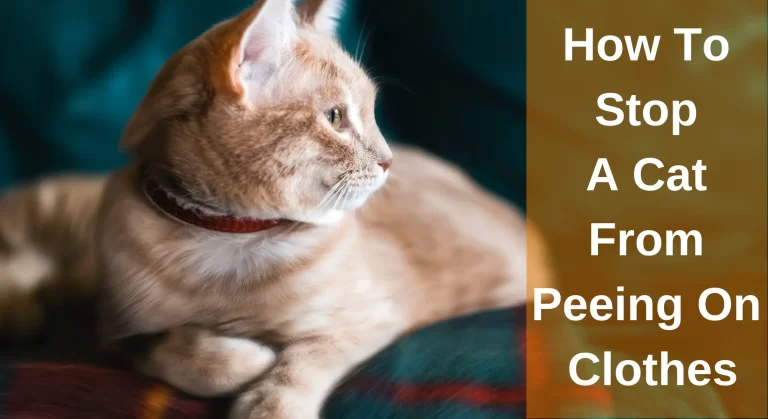Why Do Cats Run Away From Home? And What You Can Do
We all love our cats very much. No wonder it is heartbreaking when they run away from home. Cats are known for their independence and aloofness, but when they run away from home, it can be a worrying and distressing experience for their owners. Desperately looking for them and putting out flyers saying “missing cat” is even worse. So why do cats run away from home? When is it okay to start searching for them?
Cats run away to fulfil various needs like mating, hunting, unmet needs and conquering more territory. Most indoor cats do not go very far and return after a few hours. However, if your feline has not returned in over 12 hours, it is time to start searching for it.
As you read, you will discover some interesting reasons why cats go missing, what you can do to find them, and what to do when they return home.

Why Do Cats Run Away From Home? Reasons Explained
Cats are curious and independent creatures that love to explore their environment. However, this natural inclination can sometimes lead them to venture too far from home and become lost. While some cats may return home on their own, others may never be found.
As a cat owner, it is important to understand why cats run away from home and what you can do to prevent it from happening. By understanding the reasons behind this behaviour, you can take steps to keep your cat safe and secure.
1. They are in the Heat
This is the most common reason for your feline to flee from home. If it is not neutered or spayed, your cat will need a mate when it is in heat. Cats have a very strong sense of smell and about 200 million olfactory receptors.
When in heat, they can easily detect the pheromones of a stray cat and might go towards it to fulfil its needs. It may lose its way back home if it runs too far away.
The best way to tackle this is to neuter or spay them so that they do not get these urges. However, you can also invest in a GPS collar as well.
2. They’re About to Have Kittens
If you think having a pregnant feline will solve your cat’s “running away because it is in heat” problem, think again.
A knocked-up cat will look for a quiet, secluded place to have its babies, as cats prefer to deliver in a private and safe place.
If you have a rather chaotic household with other pets and children, chances are she will look elsewhere for a place to deliver.
To make sure your pregnant cat does not leave the premises, arrange a quiet, private area for your feline to have her babies, with ample food and water.
Once your cat is satisfied with the arrangement, it is unlikely your cat will leave to have its kittens.
3. They Want to Conquer More Areas
Felines are territorial, dramatic creatures, especially unneutered male cats. If your cat is comfortable with its surroundings and there are many outdoor cats, chances are your cat wants to claim the outdoor area as its own as well.
In its aggressiveness, it might get into a street fight and get seriously injured. To handle this, get your cat neutered, so its desire to be territorial is tamed.
Find Out: Do Cats Remember Where They Live?
4. Hunting Instincts
Because cats are semi-domesticated creatures, their primal instincts, including hunting instincts, are deeply ingrained in them. Therefore, your cat might have left to go on a hunting mission.
Finding a mouse or two to pounce on and kill is fine, but in its extensive ventures for prey, your cat might wander too far and lose its way back home. Unfortunately, there is nothing you can do to remove their hunting instinct.
All you can do is play with them often to drain their energy and provide them with strings and toys to pounce on instead.
5. Another Owner
If your cat disappears and returns at the same time everywhere, chances are it is having its cake and eating it too, which means it is getting some meals from somewhere else as well.
If your feline does not have a collar with a nametag and roams about, anyone else could mistake it as a stray and be feeding it regularly.
Alternatively, if your cat is missing for days, it could be that someone saw it roaming around and adopted it.
To prevent this from happening, get your cat a collar with a nametag, and talk to the neighbour that is feeding it.
6. Stress
No one likes to be wound up at home, especially cats. So if it cannot find peace at home because of a naughty kid, another pet, construction noises or moving to a new house, it will seek solace elsewhere.
If this is the case, you need to figure out what is triggering your feline and then deal with the issue.
Kids can be trained, and a separate area of the house can be dedicated to your cat. If you are moving to another place, slowly allow your cat to get accustomed to its new home.
7. Lack of Attention
Even the most mysterious cats crave attention, so it might seem that your cat is content even though it feels very lonely.
You could be working long hours, which prevents you from properly feeding it or giving it attention, so it will look for another place to fulfil its needs. If you suspect this is the case, you will need to ramp up your pet care.
If you do not have the time, you can ask a friend or family member to drop by or hire a cat sitter. If your cat is getting its requirements fulfilled, it will no longer feel the need to run away.
8. Something Scared them
If your cat was spooked by the neighbour’s dog or a loud noise and you left the window open, chances are it bolted to get as far away as possible from the source of perceived danger.
If it runs off too far, it will not find its way back. It could have been chased away while roaming outside. Whatever the case, it is best to keep your feline indoors.
Keep all windows and doors locked, and allow your cat to interact in a safe environment like a cat patio.
Also, Check Out: Will My Cat Come Back If I Let Him Outside?
9. They are Ill
When cats are not feeling well, they don’t feel like interacting and prefer to have a quiet and peaceful spot. If they cannot find it at a chaotic house, they will search elsewhere for a place to rest. If you are really fortunate, your cat will return when it has recovered.
However, because the outdoors are harsh and they are already sick, they are unable to fend for themselves and may end up passing away. You need to take your cat for regular vet visits to keep it in tip-top shape.
This will help catch and treat anything serious early on and prevent your cat from getting seriously ill, which will also prevent your feline from running away. If it does get ill, a cat needs a place where it can rest undisturbed.
10. Boredom and Lack of Stimulation
Cats that are kept indoors may become bored and restless, which can lead to a desire to explore outside.
Cats require mental and physical stimulation. Without adequate stimulation, cats may become anxious and depressed, which can lead to destructive behaviour or attempts to escape.
11. They Got Themselves into a Pickle
Cats are silly creatures and get themselves into situations they cannot get out of. It is possible that while exploring outside, it climbed a tree and got stuck up there or got caught under a fence.
This is difficult because there are many potential places a cat can get stuck; however, in most cases, their loud meows get the attention of people passing nearby.
It is best to keep your cat indoors; alternatively, you can invest in a GPS collar to trace its location in case it gets lost.
12. Because they are Cats – Curiosity and Exploration
Why do cats do anything, really? If none of the above applies to your feline, it is possible you just have a free-spirited, adventurous cat.
This sense of adventure can sometimes lead them to wander away from home in search of new sights and smells. While most cats will return home on their own, some may become lost or disoriented and have trouble finding their way back.
If all attempts to contain it have failed, it is best to accept your feline the way it is and invest in a good quality, strong name collar with a built-in GPS in case it gets lost.
What To Do If Your Cat Runs Away?
Generally speaking, cats that do go roaming about do return shortly. They have a great sense of direction and know home is where the food is. It could also be possible that your cat got scared and is hiding someplace inside the house or garden, so it is a good idea to look around your place and wait for your feline before freaking out.

However, if your cat is missing for over 12 hours or does not come back after one night, it is time to start the search. It is vital to start searching for a missing cat that has been gone for over 12 hours as, according to a study, over half of them are recovered during the search.
It depends on the type of cat you have, an indoor cat would not have to travel far, so it is best to look in your neighbourhood, whereas an outdoor cat can travel up to 300 meters.
You can try the following tricks to find your cat easier:
- Look in your house and work outward from there. More often than not, felines are hidden close by and do not wander very far.
- Upload a missing alert on social media with your cat’s name and picture, along with your phone number, so people can inform you if your pet has been found.
- Call local animal shelters and vet clinics to ask if anyone has brought in a similar-looking cat.
- Get your neighbours involved in the active search. With more searching eyes in the vicinity, chances of finding your feline increase significantly.
- Call out your cat’s name. Cats respond to humans calling out their names.
- Look in your cat’s favourite areas, such as a previous house you recently moved out of.
- Look when it is dark and quiet outside.
- Leave your feline’s belongings or your shirt on the porch and in nearby areas, as cats have a strong sense of smell and can detect the scent from afar, which can detect and follow home.
- Invest in a security camera to see if your cat comes by.
- Be patient, with neighbours informed and alerts on social media, anyone that spots your feline will inform you.
Do Cats Come Back When They Run Away?
Fortunately, cats who have gone out to hunt, mate or claim territory do come back after a certain amount of time. Felines have strong homing instincts, so they usually do find their way back eventually.
However, some cats lose their way back home, so it is wise to start a search if your feline has not returned in 12 hours or more. An active search increases your chances of reuniting with your pet.

How Do Cats Come Back Home After Running Away?
It is believed that, along with their incredible sense of smell, cats have a unique homing instinct that helps them navigate the world and find their way back home.
A lot of research has been done where cats were relocated from their homes, and they would find their way back in several hours.
It is hypothesized that cats have a distinctive ability to sense the geomagnetic field of the earth. This sense works like a compass for them and allows them to come back home.
This was further proven when magnets were attached to cats, and their ability to navigate was disrupted, showing that cats can sense the earth’s magnetic field and use geolocation to their advantage.
How To Prevent Your Cat From Running Away?
There are several precautions you can take to prevent such a stressful situation from occurring in the first place:

1. Keep Your Cat Indoors
Keep your doors and windows closed at all times, and do not let your cat roam around outside. Not only does this protect your feline from various illnesses and stray animals, but it also prevents them from being a flight risk.
If you recently moved: When shifting to a new neighbourhood, you need to be extra cautious with your feline. Make sure not to let it out at all, and keep all windows and doors closed at all times. If you do let it out, do not leave it supervised.
2. Spay and Neuter Your Feline
f you don’t want your cat to reproduce and especially cannot handle its heat phases, it is best to get your cat surgically spayed or neutered. This is a routine procedure for felines with a quick healing time that saves them from the discomfort of going into heat, prevents them from escaping to look for a mate and controls the overpopulation of cats.
3. GPS Tracker Collars
If you have a cat that stays both indoors and outdoors or a particularly adventurous pet that just will not stay put, you can invest in a good quality GPS collar that will allow you to track your pet’s location in case it gets lost.
4. TrainYyour Feline to Return
If your cat loves exploring the outdoors, call it back with a bell and a strong-smelling treat at dusk. Doing this often will train it to come back home.
Train your feline on a collar: Using a cat collar and going for walks often will allow your cat to get used to the collar and explore the outdoors while you get your daily walk-in and bond with your pet.
5. Arrange a Catio
Catios are small enclosures made of strong mesh walls with plantation. It allows your cat to explore and feel like it is outside without the dangers of the outside world.
6. Take Good Care of Your Cat
A new addition to the family: If you recently had a baby, make sure your cat slowly warms up to it. Also, give your cat a lot of pets and treats as they may feel neglected during this sudden change.
Provide your feline with food, water, a lot of attention, frequent treats and regular vet visits so your cat never has a reason to run away.
Frequently Asked Questions
How long do cats run away from home?
Cats generally go away for several hours to fulfil their hunting, mating or exploring instincts. They return home once they are done with their outdoor endeavours.
Do cats miss you when they run away?
Yes, cats do miss their owners after a few hours of detachment. However, whether or not they actually do miss their owners may depend on the individual cat’s personality and experiences. Some cats may be more attached to their owners and feel more strongly about being separated from them, while others may not seem to care as much.
Do cats understand when you cry?
Cats are very tuned into human emotion, so they can easily sense when you are upset and do understand when you cry.
Can indoor cats still run away from home?
Yes, indoor cats can still run away from home if they are not properly supervised or provided with adequate stimulation and enrichment.
How can I prevent my cat from becoming bored and restless?
You can prevent your cat from becoming bored and restless by providing plenty of stimulation and enrichment, such as toys, scratching posts, and interactive playtime.
Can outdoor enclosures be a safe alternative to letting cats roam free?
Yes, outdoor enclosures can provide cats with the opportunity to enjoy the outdoors while remaining safe and secure.
How far can a cat travel before getting tired?
Cats are known for their stamina and can travel long distances without getting tired. Some cats have been known to travel over 1,000 miles to return home.
why do female cats run away from home?
Female cats may run away from home for many of the same reasons as male cats, including instincts, stress and anxiety, and health issues. However, female cats may also run away when they are in heat and seeking a mate. It’s important to have female cats spayed to prevent unwanted pregnancies and reduce the likelihood of them running away in search of a mate.
Final Verdict!
Cats are mysterious, adventurous creatures that love exploring the outside world. They are competitive with outdoor cats, need a mate during heat and sometimes need to hunt.
They may also be getting food from a kind stranger. If your cat has been missing for over 12 hours, you need to go on a search. Fortunately, the sooner you act, the more chances you will be reunited with your cat.
Who is Isabella?
My name is Isabella, and I am a dedicated and knowledgeable cat enthusiast. With years of experience caring for cats and a deep love for felines, I made a mission to help other cat lovers navigate the challenges of cat ownership.






